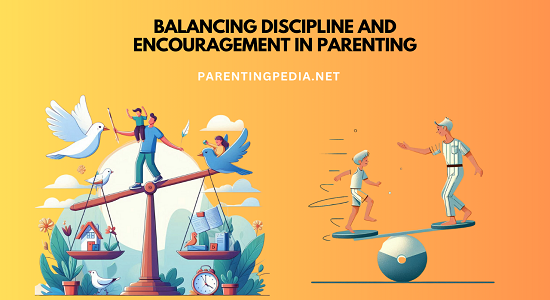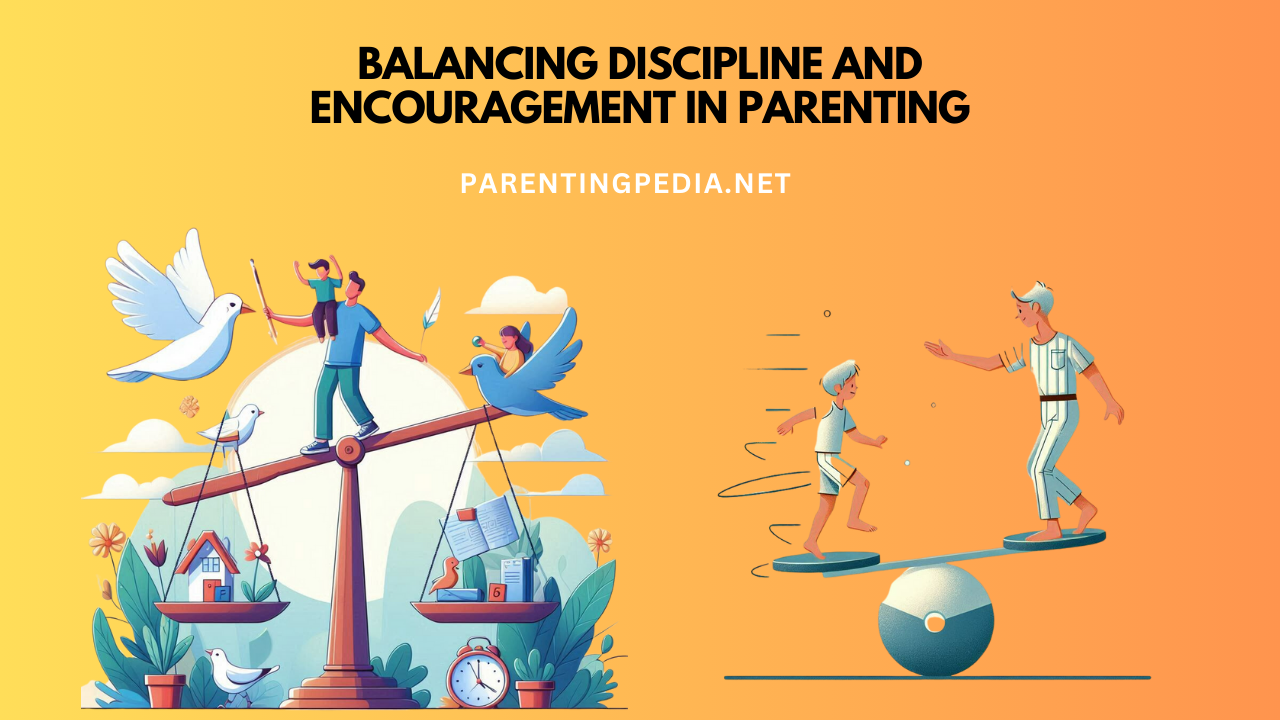Balancing discipline and encouragement is a vital aspect of effective parenting. Discipline and encouragement are two key components in children development where they are guided towards becoming responsible, empathetic, and well-adjusted adults. Discipline helps set boundaries and teach children about acceptable behavior, while encouragement promotes self-esteem, confidence, and a sense of accomplishment in child. Balancing these two aspects is crucial for raising children who are not only well-behaved but also emotionally resilient and motivated. This article will state the importance of both discipline and encouragement, the challenges of finding the right balance by parents, and strategies for effectively integrating both discipline and encouragement into parenting.
The Importance Of Discipline In Parenting
Discipline is often misunderstood as punishment, but it is about teaching children self-control, responsibility, and respect for others. Effective discipline helps children understand the consequences of their actions and learn how to make better choices in the future. It provides the structure and consistency that children need to feel secure and to understand the difference between right and wrong.
Teaching Self-Regulation and Responsibility: One of the primary goals of discipline is to help children develop self-regulation. Self-regulation means ability to manage one’s emotions, behavior, and impulses. When children learn to self-regulate, they can control their reactions to different situations, which is important for social interactions and academic success. Discipline teaches children that their actions have consequences, which in turn promotes a sense of responsibility in them.
Establishing Boundaries And Expectations: Discipline also involves setting clear boundaries and expectations. Children need to know what is expected of them and what the limits are. Boundaries help children feel safe and secure because they provide a predictable environment. When parents set consistent rules and enforce them, children understand what is acceptable behavior and what is not. This clarity reduces confusion and help children develop strong ethics in life.
Promoting Respect And Empathy: Discipline is essential in teaching children respect and empathy. By learning to respect rules and authority, children also learn to respect others person’s rights and feelings. When discipline is enforced in a way that emphasizes understanding and empathy, children learn to consider how their actions affect others.
The Role Of Encouragement In Parenting
While discipline is necessary for setting boundaries and teaching responsibility, encouragement is equally important for nurturing a child’s self-esteem, confidence, and motivation. Encouragement involves recognizing and reinforcing positive behavior, efforts, and achievements. It helps children in developing a positive self-image and growth mindset, where they see challenges as opportunities to learn and grow.
Building Self-Esteem And Confidence: Encouragement plays a vital role in building a child’s self-esteem. When parents acknowledge their child’s efforts and successes, the child feels valued and capable. This positive reinforcement boosts child’s confidence and motivates him/her to continue working hard in life and achieve success.
Also Read: Tips on How to Discipline Your Children Without Yelling
Promoting a Growth Mindset: A growth mindset is the belief that abilities and intelligence can be developed through effort, learning, and persistence. Encouragement promotes this mindset by emphasizing the value of effort rather than just the outcome. When parents praise children for their hard work and determination, rather than simply the end result, children learn to overcome challenges and view failure as a learning opportunity. This mindset is crucial for lifelong learning and personal development of child.
Strengthening Parent-Child Relationships: Encouragement also strengthens the parent-child relationship. When children feel supported and appreciated, they are more likely to trust their parents and seek their guidance. This trust forms the foundation of a strong and healthy relationship, where open communication and mutual respect develop over time. Encouragement promotes a positive emotional connection between parents and child, making children more receptive to guidance and discipline.
Challenges Of Balancing Discipline And Encouragement
While both discipline and encouragement are essential components of effective parenting, finding the right balance can be challenging. Parents may struggle with being too lenient or too strict, and achieving balanced mix of these approaches requires careful consideration and strategy by parents.
Avoiding Over-Discipline: One of the main challenges in balancing discipline and encouragement is avoiding over-discipline. When discipline is excessive or overly harsh, it can lead to negative outcomes such as fear, resentment, and low self-esteem. Children who experience constant criticism or punishment may become anxious, rebellious, or withdrawn over time. Over-discipline can also damage the parent-child relationship, leading to lack of trust and communication between them. It is important for parents to recognize that discipline should be about teaching and guiding, not just punishing.
Risks Of Being Overly Lenient: Being overly lenient can also have negative consequences. Without clear boundaries and consistent discipline, children may struggle with self-control and responsibility. They may become entitled, disrespectful, or unable to cope with challenges in adult life. Over leniency can lead to behavioral problems, as children may not understand the importance of rules and consequences. It is crucial for parents to enforce rules consistently while still offering support and encouragement to child.
Striking Right Balance In Discipline And Encouragement: Striking the right balance between discipline and encouragement requires flexibility and awareness by parents. Parents need to assess their child’s individual needs, temperament, and the specific situation at hand. Some children may require more structure and discipline, while others may thrive with more encouragement and freedom. The key is to be responsive to the child’s behavior and to adjust the approach as needed. It is also important for parents to be consistent in their discipline while remaining empathetic and supportive towards child.
Strategies For Balancing Discipline And Encouragement
Achieving a balance between discipline and encouragement is a process that involves thoughtful strategies and practices. Here are some effective approaches that can help parents find this balance:
Positive Discipline: Positive discipline focuses on teaching and guiding rather than punishing. It involves setting clear expectations, providing consistent consequences, and using positive reinforcement to encourage good behavior in child. This approach helps children understand the importance of responsibility while also feeling motivated by positive outcomes of their actions.
Clear And Consistent Communication: Effective communication between parents and child is essential for balancing discipline and encouragement. Parents should clearly communicate their expectations, rules, and the reasons behind them. When children understand the reason for rules, they are more likely to comply by them. Additionally, parents should actively listen to their children’s thoughts and feelings, validating their emotions while guiding them toward better behavior.
Setting Realistic Expectations: Setting realistic expectations is crucial for both discipline and encouragement. Parents should consider their child’s age, developmental stage, and individual temperament when establishing rules and expectations. Unrealistic expectations can lead to frustration for both the parent and the child. By setting achievable goals and gradually raising expectations as the child matures, parents can encourage a sense of accomplishment and build their child’s confidence.

Conclusion
Discipline and encouragement both are needed for effective development of child. While discipline provides the structure and boundaries necessary for children to develop self-regulation, responsibility, and respect, encouragement nurtures their self-esteem, confidence, and motivation. Finding the right balance between discipline and encouragement requires thoughtful strategies, clear communication, and a deep understanding of the child’s individual needs. By implementing positive discipline techniques, modeling desired behavior, and promoting a growth mindset, parents can raise children who are not only well-behaved but also resilient, confident, and capable of facing life challenges.
FAQ
Why is encouragement important in parenting?
Encouragement in parenting is vital as it boosts a child’s self-esteem, confidence, and motivation. It helps children develop a positive self-image, promote a growth mindset, and strengthens the parent-child bond. Through encouragement, children feel valued and supported, which is essential for their emotional and psychological development.
How do parents balance encouragement and discipline in child development?
Parents balance encouragement and discipline by setting clear expectations and consistent rules while recognizing and praising effort. They use positive reinforcement to motivate good behavior in child. This approach nurtures self-regulation and confidence, ensuring children are disciplined yet supported in their development.
Remember, the greatest reward of parenting lies in watching
your children soar with love and confidence.
Till then keep smiling and be happy
🎉 Score Freebies by Completing Fun Offers – Start Now!

